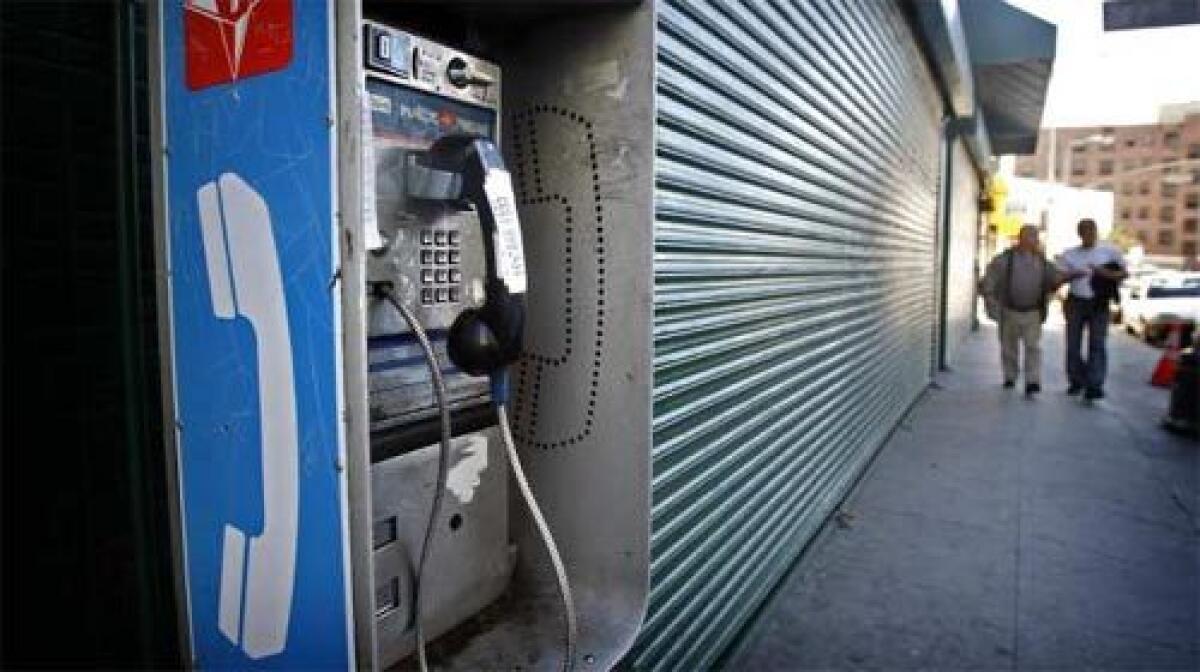AT & T to hang up on pay phones

- Share via
AT&T Inc. is getting out of the business that gave Agent 86 a cunning way to enter CONTROL headquarters in “Get Smart.”
The nation’s largest phone company said Monday that it would stop owning and operating public pay phones by the end of next year. But that doesn’t necessarily mean Superman will have to find a new changing room.
San Antonio-based AT&T -- which operates 65,000 pay phones around the country, including 21,000 in California -- will put them up for sale. Independent operators already own more than half of the estimated 1 million such devices in the U.S. and probably will bid on those being put on the block by AT&T.
Even in the age of mobile handsets and BlackBerrys, people still drop quarters into public phones. About 5% of all U.S. households, and 8% of those with annual incomes under $20,000, have access to neither wireless nor land-line phones.
Then there’s Augustin Barajas, who has a cellphone but sometimes can’t manage to pay the bill on his $300-a-week salary. Barajas, calling his girlfriend in Echo Park on Monday from one of the neighborhood’s scattered pay phones, said they shouldn’t be done away with entirely.
“It’s always good to have pay phones in case cellphones go down,” he said.
Pay phones got their start in the U.S. in 1878 as pay stations; people paid attendants after making calls. Coin-operated public phones were introduced in 1889. They were indispensable until private phone lines began to proliferate after World War II.
Now they’re iconic, having had starring roles in, among others, the 1960s TV sitcom “Get Smart” (also telephonically famous for Maxwell Smart’s shoe phone); the “Superman” movies and television shows; the 1989 movie “Bill & Ted’s Excellent Adventure,” in which the two main characters travel through time in a phone booth; and “Phone Booth,” a 2002 film that depicts Colin Farrell trapped in a booth as a gunman tries to kill him.
These days, “more and more people are using their wireless phones instead of pay phones,” AT&T spokesman Michael Coe said. The pay phone business “is rapidly approaching the point where it will not be profitable.”
The number of pay phones in the U.S. has declined from about 2.1 million in 1999 to about 1 million today, according to Federal Communications Commission statistics.
AT&T and Verizon Communications Inc. are the last two major companies still in the business. BellSouth Corp. unloaded its pay phones in 2003, before AT&T acquired the company at the end of last year, and Qwest Communications International Inc. sold its pay phone division in 2004.
Verizon spokesman Jim Smith said the New York-based company, which has 225,000 pay phones in 28 states and the District of Columbia, had no current plans to quit the business.
Willard Nichols, president of the American Public Communications Council Inc., which represents independent pay phone owners, said he saw a bright future.
“I honestly don’t think the demise of pay phones is around the corner,” he said, noting that Americans make an estimated 1.7 billion calls from pay phones every year. “Particularly for the poor segments of the U.S. population, the pay phone is a lifeline.”
California subsidizes public phones in places that serve a public purpose and in those few areas in the state where residents can’t subscribe to a phone service. Bill Nusbaum, senior telecommunications attorney for the Utility Action Reform Network, a consumer advocacy group, noted that the California Public Utilities Commission was considering a proposal to dismantle these pay phones.
AT&T and other telecommunications providers should “step up and say we have some type of obligation to the public” to provide pay phones, Nusbaum said.
That’s especially true when AT&T’s own phone service can be unreliable, said Marcin Nowak, a 27-year-old freelance audio editor in Echo Park who has had a cellphone with AT&T service for five years.
The only time Nowak can remember using a pay phone? The last time AT&T’s wireless network was down and he really needed to make a call.
More to Read
Sign up for Essential California
The most important California stories and recommendations in your inbox every morning.
You may occasionally receive promotional content from the Los Angeles Times.











